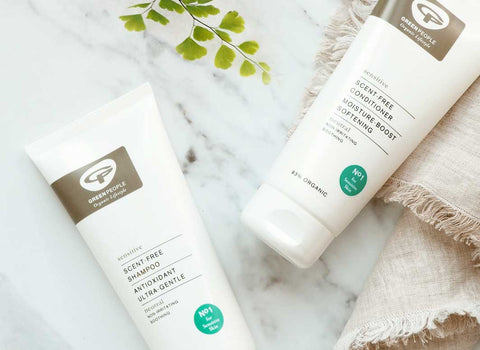Having a sensitive scalp could mean a number of different things; you could be prone to dandruff, itchiness, tenderness, or perhaps even psoriasis on your scalp.
While you may experience sensitivity in different ways, each concern can have a big impact on your overall feeling of wellbeing. It can be difficult to identify the root cause of your sensitive scalp and you may be left feeling confused or frustrated.
In this article we will be discussing some of the most common causes of scalp sensitivity, and giving you some tips to help care for your sensitive scalp.
4 sensitive scalp causes
We asked Green People’s cosmetic scientist, Ian Taylor, to outline some of the most common causes for a sensitive scalp, including some ingredients to look out for in your hair care products.
1. Synthetic fragrance
While a powerfully fruity or floral scent to your shampoo may seem appealing, it could spell bad news if you suffer with a sensitive scalp.
Synthetic fragrance is the number one cause of skin reactions to cosmetics, and mainstream hair care products are some of the most heavily scented beauty products on the market.
By law, companies are not required to disclose specific fragrance ingredients used in a product, they can simply state ‘parfum’ on the ingredients list.
This can make it confusing and difficult for people to be sure whether or not they will react to a product.
Green People never uses synthetic fragrance in any product and provides a full list of every ingredient on our website, helping you make an informed choice.
For those who are ultra-sensitive, the scent-free hair care range is made without essential oils and is suitable for those who may be prone to eczema, dandruff and psoriasis.

2. Sodium lauryl sulphate (SLS)
Another likely cause of a sensitive scalp is the use of harsh detergents in shampoo. SLS is found in the majority of high street shampoos and body washes and is a known irritant, even for those whose skin isn’t usually sensitive.
Cosmetic Scientist Ian Taylor says:
“Most detergents have the potential to cause scalp irritation, but some (like SLS) are more irritating than others.
This is due to the way that they clean, by allowing water to mix with oils so that dirt can be washed away.
As part of this action, the skin’s natural protective barrier can be impaired, increasing trans-epidermal water loss and allowing potential irritants to penetrate deeper into the skin.
To guard against this, it is important to choose milder detergents that can remove dirt and grime without stripping the skin of moisture and disrupting the skin’s healthy balance.
It is also important that detergents are thoroughly rinsed away after washing, as even slight traces left on the skin will cause irritation over time.”
All Green People shampoos are SLS-free and use naturally derived foaming agents that are gentle on even the most sensitive skin.
3. Dying or bleaching your hair
We all know how damaging bleach can be for your hair, and the same can be said for your scalp.
Using bleach to colour your hair can cause severe scalp irritation, and even hair loss, as this extremely harsh chemical can totally disrupt the healthy balance of your scalp.
Those with a sensitive scalp should avoid using peroxide-based dyes and may wish to avoid colouring their hair completely.
If your hair is already colour damaged and in need of repair, try Green People’s Intensive Repair Shampoo and Conditioner.
This strengthening duo is enriched with nourishing organic actives from Quinoa, Pineapple and Green Tea to restore vitality, smoothness and shine, while soothing Aloe Vera helps to re-balance your scalp.

4. Dry shampoo
While a quick spritz of dry shampoo may be a time-saver in your morning routine, this shortcut can cause problems in the long-run for people with a sensitive scalp.
Liquefied petroleum gas, alcohol (liquid ethanol) and synthetic fragrance are all found in some popular brands of dry shampoo. These synthetic chemicals have little to no affinity with human skin and may cause dryness and irritation for sensitive scalps.
When you wash your hair with shampoo and water, you rinse away build-up on the scalp and prevent hair follicles from becoming clogged with dead skin cells and impurities.
Using a dry shampoo causes more build-up on the scalp, simply absorbing excess oils to give the appearance of clean hair. If you don’t wash your hair regularly, hair follicles become blocked which may result in an itchy, flaky scalp.
Instead of applying dry shampoo, try using a patterned scarf or headband to cover oily roots if you don’t have time to wash your hair.
How to care for your sensitive scalp
- Wash your hair regularly with SLS-free shampoo
- Use gentle, natural hair care products
- Use warm water to wash your hair, not hot
- Rinse your hair thoroughly to remove all traces of shampoo
- Brush your hair gently, starting at the ends
- Use the coolest setting on your hairdryer
- Avoid using bleach and other harsh hair dyes
Discover a shampoo and conditioner perfect for sensitive scalps
Do you have any questions or comments about caring for a sensitive scalp? You can contact our friendly customer care team by emailing organic@greenpeople.co.uk, or call 01403 740350









